Democracy is consolidating across Africa. Free and contested elections are increasingly the norm rather than the exception, and we are experiencing peaceful turnovers of power from incumbents to challengers. Notwithstanding the benefits of democracy, though, some aspects of the democratic process in Africa can insert inefficiencies in policy formulation and implementation. The example of Ghana during my time as the convener of the economic advisory council (2009-2012) and as the senior presidential economic adviser (2009-2016) provides an illustration.
Ghana is a vibrant democracy where elections are vigorously contested. They are generally free and fair, and voter participation rates are high. Two political parties—the New Patriotic Party (NPP) and the National Democratic Congress (NDC)—have dominated the political scene since 1992. No political party has been able to succeed itself after the mandatory two-term limit of four years each.
Elections in Ghana are “winner takes all.” The spoils are: the right to appoint ministers, presidential staffers, managers and board members of all parastatals, and more importantly, the right to award contracts.
The political parties define themselves by ideology. The NDC claims social democracy while the NPP is liberal democratic. There are also differences in the geographic support base of the two dominant parties. The Ashanti Region is NPP’s stronghold while the Volta and Northern Regions reliably vote for the NDC. The Accra Metropolis as well as the Central and Western Regions are typically swing regions. The parties also attempt to distinguish themselves by touting “competence,” past record, and the character of their leadership (honesty, corruptibility, charisma, and modesty). Remarkably, neither the NPP nor the NDC draws its support from any identifiable socio-economic group. In fact, party supporters appear to be no more than associations of prominent individuals and their followers or “fan clubs.” [1]
For the most part, elections are contested on the basis of promised infrastructure projects, utility price reductions, the restoration of allowances, payment of arrears, and the elimination of (school) fees, etc. Neither party is associated with consistent and coherent policies to favor a particular socio-economic group or economic activity.
Labor in Ghana (unions, trade associations, and the self-employed) and other socio-economic groups are very vocal on pocketbook issues. Successive governments have thus enacted policies such as Single Spine Salary adjustments,[2] cocoa price increases, reductions in petroleum, and electricity prices to appease voters. Invariably, these policies are perceived and/or presented as “gifts” from a caring government.
The administrations scrupulously avoid policies that would negatively impact a specific socio-economic group, especially organized labor. Because of this strategy, administrations almost always opt for indirect taxation as opposed to direct taxation for mobilizing domestic resources. Thus, the tax-to-GDP ratio is very low, while economic rents are important sources of government revenues. Infrastructure is mostly financed through foreign (sovereign) loans, government bond issues, and private-public partnerships (PPP). The last two sources dictate downward trending interest rate policies to maintain bond prices and put a premium on exchange rate stability. In any case, exchange rate and tariff policies are designed to favor consumption as opposed to production.
Thus, the nature of Ghana’s political landscape is particularly important in shaping the country’s policy decisions. For example, the different administrations are keen to showcase their economic achievements. Windfall rents from the extractive industries are channeled into investment. On the flip side, the Ghanaian polity slows economic growth, promotes inefficiency, and is inimical to inclusive and broad-based development. Contracts are awarded to individuals perceived as sympathetic to the political party in power. As a result, a viable and dynamic national private sector is slow to emerge as few contractors (engineering and architectural firms, for example) survive the eight-year cycle of political alternation of power. Contracts awarded under previous administrations are often canceled or forcibly renegotiated, leading to sizable judgement debts.
Rivalry between and within political parties for control over the management of infrastructure projects can be debilitating. Opposing parties rarely complete projects initiated under other administrations. A case in point is the $3 billion Chinese Development Bank Infrastructure facility that was negotiated under the NDC. Despite the critical importance of the facility for the then-nascent oil and gas sector, railways, fisheries, and agriculture, the opposition parties were, expectedly, very hostile to the facility. Moreover, there was intense competition among leading members of the NDC to represent Chinese contractors.[3] The result was that contracts awarded under the facility rarely went through any meaningful competitive bidding. Some planned projects were simply abandoned due to difficulties in arbitrating between rival NDC representatives of Chinese contractors.
The Ghanaian paradox
The political economy of policy formulation and implementation has led to outcomes that we characterize as the Ghanaian paradox. The economy has been very vibrant. Growth rates have been respectable and, at times, spectacular, though the exceptional performances are usually linked to booms in the primary sectors. There has been heavy investment in productive, transport, and housing infrastructure. Moreover, Ghana has experienced a relatively stable macroeconomic environment of moderate inflation, stable exchange rates, downward trending interest rates, and sustained public sector wages since 2000.
At the same time, the economy is afflicted with crushing indebtedness and unemployment. Income distribution is grotesquely skewed. There is underfunding of social programs. The bulk of the population is increasingly impoverished. Social tensions are heightened. The population bitterly complains about unkept promises and predictably votes for “change” every eight years.
The Ghanaian case demonstrates that democracy does not always get it right, and it is definitely not a panacea. In fact, democracy is guaranteed to get it wrong if the choices are all unpalatable (i.e., six of one versus half a dozen of the other). The agenda for reform in Ghana must include economic, regulatory, and political measures. Campaign financing laws must be reformed to eliminate “pay to play,” cronyism, and influence peddling. It is an affront to economic efficiency and justice that contracts are awarded exclusively to party financiers, party-faithful, and family members.
In conclusion, as democracy makes more inroads and consolidates across Africa, it would be important to ensure that political parties emerge that are more inclusive and reflect the socio-economic aspirations of the broad segment of the population. Moreover, specific socio-economic groups need to find their voices on issues such as the management of national resources and economic and trade policies, as well as demand political representation, regulatory, and political reforms. This would minimize inefficiencies in policy formulation and implementation so that Africa can better pursue policies that promote employment, the local private sector, economic efficiency, and broad-based development.
end notes
[1] Ethnic affiliations play much less a role in Ghanaian politics than elsewhere in Africa. Party support in Ghana is often compared (accurately) to the fan base of football or sports clubs. Party affiliations are strong and passionate but are rarely based on the ethnicity of the political candidate(s).
[2] The Single Spine Salary Adjustment exercise in 2010 regraded all public-sector positions and assigned salaries on a single public-sector wage scale. In practice, it led to significant salary increases for most public-sector employees.
[3] The Presidential Task Force, chaired by the author, had strict instructions to insist that Chinese EPC contractors work with local partners or representatives. There was no requirement for the use of local labor. Thus, the projects were delivered “turn-key” with mainly Chinese workers.
The Brookings Institution is committed to quality, independence, and impact.
We are supported by a diverse array of funders. In line with our values and policies, each Brookings publication represents the sole views of its author(s).

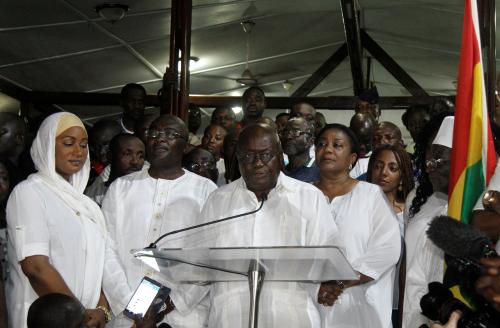
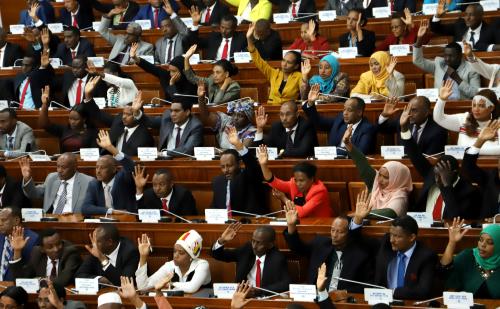
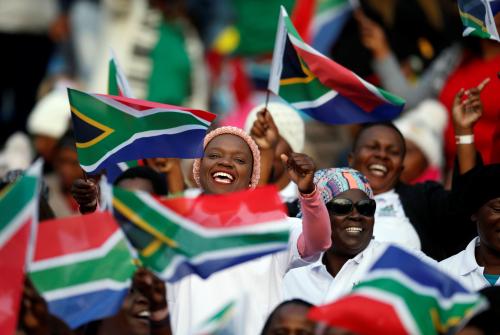
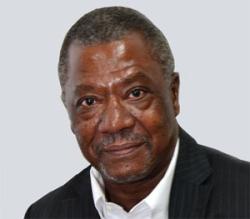
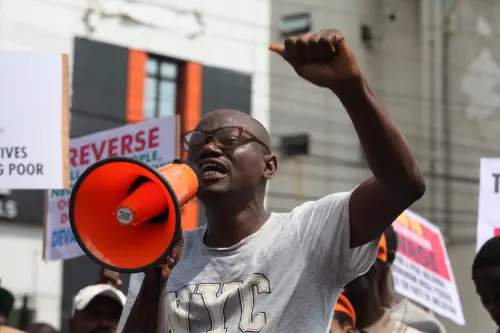
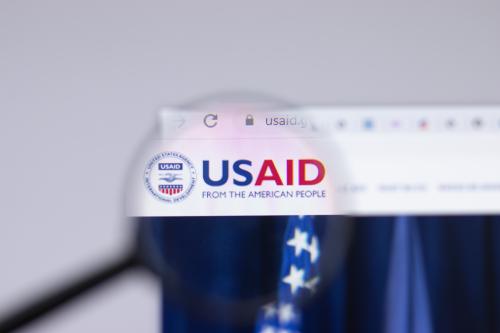

Commentary
Politics, policy, and implementation: The ‘Ghanaian Paradox’
July 18, 2018